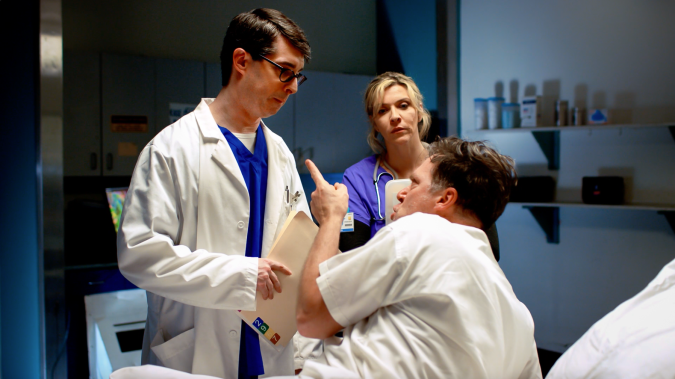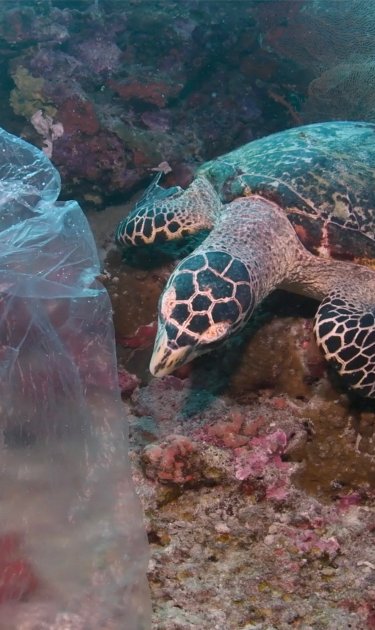For many years, Sofia Pineda Ochoa had one goal: to become a doctor in the United States. Born and raised in Guadalajara, she did everything she needed to accomplish that. After finishing medical school in Guadalajara, she moved to the U.S. to begin the post-graduate training she needed to practice medicine across the border from where she’d lived her entire life. But such well-made plans slowly gave way to a much more different path, which finds her now premiering a documentary film all about the perils of climate change and the myriad of environmental issues that afflict our everyday lives.
Part TED Talk and part dystopian vision of a future ravaged by man-made disasters, Endgame 2050 is, above all, a call to arms. In addition to offering a string of experts talking about everything from the need to move toward plant-based diets and the disastrous effects of climate change, it also features a short fictionalized take on a not-so-distant future where food and water shortages are daily occurrences.
Pineda Ochoa had long been interested in environmental activism. But she vividly remembers the moment in 2012 when she witnessed the kind of scene that made what had before been quite abstract convictions into real-life effects. While living in Texas she witnessed the entire beach of Galveston being covered in dead fish.
“It was apocalyptic,” she tells Remezcla. “It was awful. You could smell the dead fish as soon as you crossed the main bridge into the main island. I had never seen that before but apparently that had happened before.” Her research showed that such a rare event was caused by ‘dead zones’ where the levels of oxygen drop enough in the water that they encourage certain algae to bloom, further throttling the oxygen supply, which makes it uninhabitable for fish. Warmer temperatures, for instance, are said to contribute to these kinds of events.

Such stench of death marked the other key moment that led her to further immerse herself in environmental activism: while researching the impact of our diet on the environment, she visited a slaughterhouse. “I was just there filming but I felt complicit in the crime,” she remembers, noting that the cruelty she witnessed there was hard to shake off. It’s those moments Pineda Ochoa recalls now as she readies to launch Endgame 2050 into the world, hoping the scenarios and urgent discussions it portrays can sway viewers to take more seriously what, at times, can already feel like a losing battle.
As Moby (yes, that Moby) explains at the outset of the film, talking about the environmental problems plaguing the Earth can feel like talking to a drunk person on drugs driving along a street seconds before a collision. In their mind, everything is fine. Everything is not, objectively speaking, fine, but they are so blissfully unaware of what’s happening that it’s only by the time they crash that they may get to reassess their surroundings and realize that lots of decisions needed to be different even before they got behind the wheel should they have wanted to avoid the accident altogether. Endgame 2050 wants to be that warning sign and getting someone like Moby was key for that message to come through loud and clear.
“He’s been concerned about these things for decades, even before he was famous. I really respect Moby and he’s very genuine,” Pineda Ochoa notes. Which made booking him an uphill battle. “When I started making this film I always had him in mind. He’s so devoted and so thoughtful.” It would take more than a year of talks to get him on board, but eventually he did, even offering, at no cost, some of his music to the project.
But more than his celebrity, Pineda Ochoa was interested in getting someone who, unlike the many scientists and experts she interviews on camera, could distill the complex ideas she was presenting into simple, conversational soundbites. “He cuts through the fluff and he’s very direct. I think his participation made the film a lot more assertive.”
Pineda Ochoa has one clear goal with Endgame 2050: to convince whoever watches it that no one simple thing is going to help prevent these environmental disasters. “Other documentaries make it seem like, if you just change your lightbulb to an energy efficient lightbulb, you can just pat yourself on the back. They really don’t want to make people uncomfortable. I feel like the reality they present is always sugarcoated. So I guess the message that I wanted to get across is the severity of it.”
Change, as Endgame 2050 suggests, needs to come not just at an individual level. Such a call to action can feel overwhelming, especially when we’ve been trained to think that if we just change our diet or recycle more or depend less on fossil fuels we can make a difference. And we can. But alongside such changes in behavior we need to demand larger systemic changes otherwise the future of Endgame 2050 will be less science fiction and more gritty reality.
Endgame 2050 begins streaming for free on YouTube May 23, 2020 and is streaming now on Tubi.




